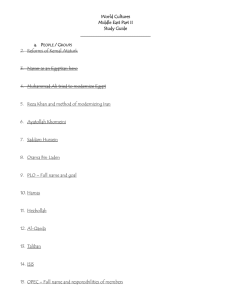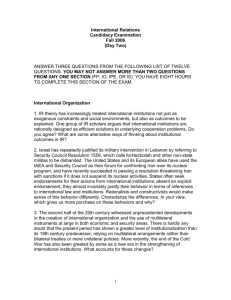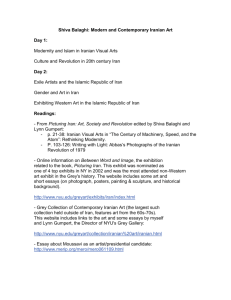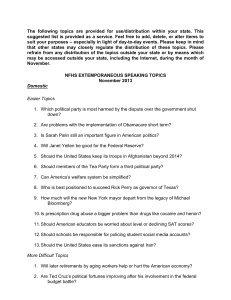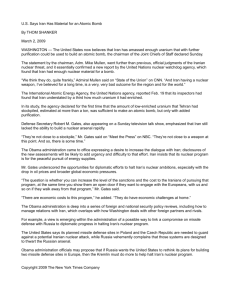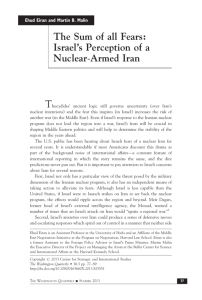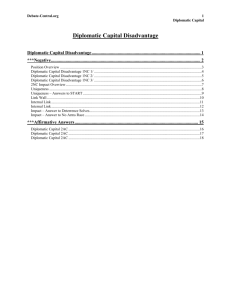Excerpts from Nuclear Terrorism: The Ultimate Preventable
advertisement
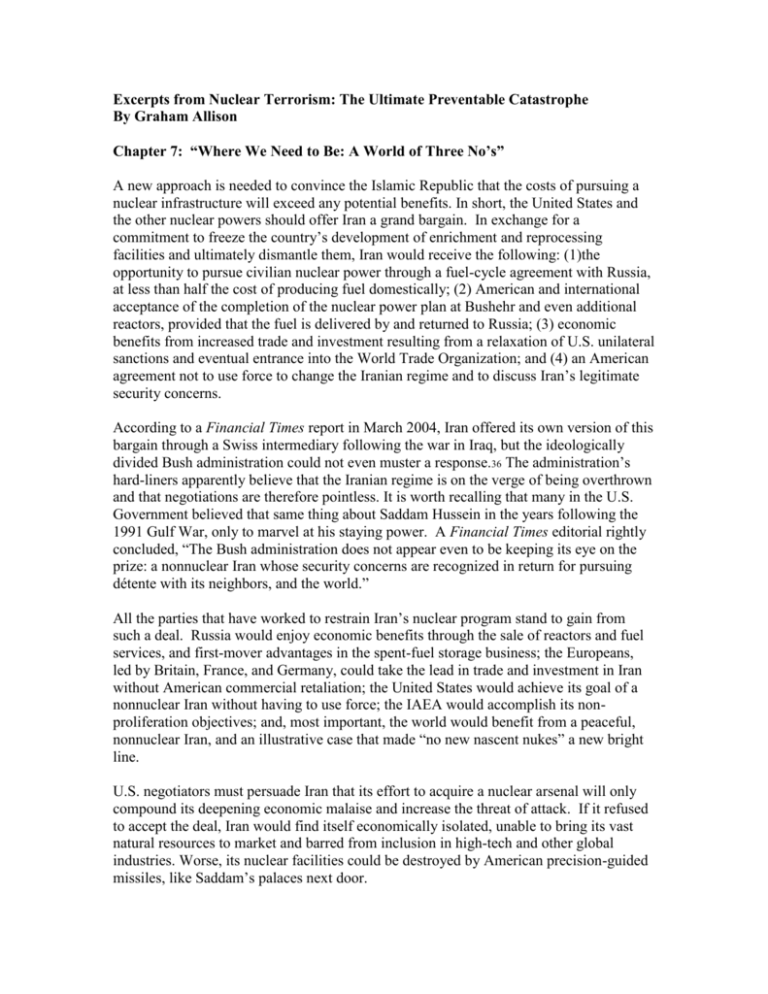
Excerpts from Nuclear Terrorism: The Ultimate Preventable Catastrophe By Graham Allison Chapter 7: “Where We Need to Be: A World of Three No’s” A new approach is needed to convince the Islamic Republic that the costs of pursuing a nuclear infrastructure will exceed any potential benefits. In short, the United States and the other nuclear powers should offer Iran a grand bargain. In exchange for a commitment to freeze the country’s development of enrichment and reprocessing facilities and ultimately dismantle them, Iran would receive the following: (1)the opportunity to pursue civilian nuclear power through a fuel-cycle agreement with Russia, at less than half the cost of producing fuel domestically; (2) American and international acceptance of the completion of the nuclear power plan at Bushehr and even additional reactors, provided that the fuel is delivered by and returned to Russia; (3) economic benefits from increased trade and investment resulting from a relaxation of U.S. unilateral sanctions and eventual entrance into the World Trade Organization; and (4) an American agreement not to use force to change the Iranian regime and to discuss Iran’s legitimate security concerns. According to a Financial Times report in March 2004, Iran offered its own version of this bargain through a Swiss intermediary following the war in Iraq, but the ideologically divided Bush administration could not even muster a response.36 The administration’s hard-liners apparently believe that the Iranian regime is on the verge of being overthrown and that negotiations are therefore pointless. It is worth recalling that many in the U.S. Government believed that same thing about Saddam Hussein in the years following the 1991 Gulf War, only to marvel at his staying power. A Financial Times editorial rightly concluded, “The Bush administration does not appear even to be keeping its eye on the prize: a nonnuclear Iran whose security concerns are recognized in return for pursuing détente with its neighbors, and the world.” All the parties that have worked to restrain Iran’s nuclear program stand to gain from such a deal. Russia would enjoy economic benefits through the sale of reactors and fuel services, and first-mover advantages in the spent-fuel storage business; the Europeans, led by Britain, France, and Germany, could take the lead in trade and investment in Iran without American commercial retaliation; the United States would achieve its goal of a nonnuclear Iran without having to use force; the IAEA would accomplish its nonproliferation objectives; and, most important, the world would benefit from a peaceful, nonnuclear Iran, and an illustrative case that made “no new nascent nukes” a new bright line. U.S. negotiators must persuade Iran that its effort to acquire a nuclear arsenal will only compound its deepening economic malaise and increase the threat of attack. If it refused to accept the deal, Iran would find itself economically isolated, unable to bring its vast natural resources to market and barred from inclusion in high-tech and other global industries. Worse, its nuclear facilities could be destroyed by American precision-guided missiles, like Saddam’s palaces next door. In fact, Israel might conduct such an attack. Prime Minister Ariel Sharon told the Times of London in November 2002 that he would push Iran to the top of the “to-do list” after the war in Iraq. A year later, Israel’s defense minister, Shaul Mofaz, drew a line in the sand, declaring an Iranian nuclear bomb “intolerable” and warning that “only a few months are left for Israel and the world to take action and prevent Iran from getting the nuclear bomb.” Israel has recently been flexing its military muscles in ways not lost on Iranian intelligence. And Iran can have no doubt about Israel’s willingness to pull the trigger, having witnessed the Israeli Air Force’s destruction of Saddam’s nuclear reactor at Osirak in 1981. As European negotiators explain to Iranian leaders that acceptance of their demands is Iran’s best hope to hold off American military action, U.S. officials can explain that meeting America’s requirements is the only way to forestall Israeli action. Iran’s conservative leaders have shown themselves to be pragmatic in calculating and choosing their best option, even when it is not the preferred option. They are not likely to conclude that economic isolation and American or Israeli bombs serve their regime’s best interests.


